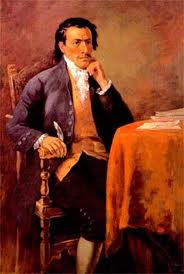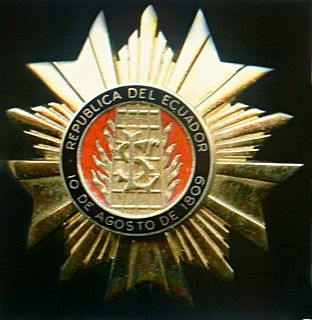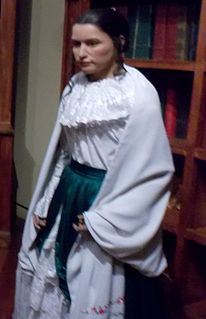Related Research Articles

Ecuador, officially the Republic of Ecuador, is a country in northwestern South America, bordered by Colombia on the north, Peru on the east and south, and the Pacific Ocean on the west. Ecuador also includes the Galápagos Islands in the Pacific, about 1,000 kilometres (621 mi) west of the mainland. The capital is Quito.

Quito is the capital of Ecuador and at an elevation of 2,850 metres (9,350 ft) above sea level, it is the second highest official capital city in the world, and the closest to the equator. It is located in the Guayllabamba river basin, on the eastern slopes of Pichincha, an active stratovolcano in the Andes Mountains.

Antonio José de Sucre y Alcalá, known as "Gran Mariscal de Ayacucho", was a Venezuelan independence leader who served as the 4th President of Peru and as the 2nd President of Bolivia. Sucre was one of Simón Bolívar's closest friends, generals and statesmen.

Francisco Javier Eugenio de Santa Cruz y Espejo was a medical pioneer, writer and lawyer of mestizo origin in colonial Ecuador. Although he was a notable scientist and writer, he stands out as a polemicist who inspired the separatist movement in Quito. He is regarded as one of the most important figures in colonial Ecuador. He was Quito's first journalist and hygienist.

Riobamba is the capital of Chimborazo Province in central Ecuador, and is located in the Chambo River Valley of the Andes. It is 200 km (120 mi) south of Ecuador's capital Quito and located at 2,754 m on the Avenue of the Volcanoes.

Juan de Dios Martínez Mera was 23rd President of Ecuador from 1932 to 1933. He was President of the Chamber of Deputies in 1921. He was Minister of Finance from 1929 to 1930, and from 1931 to 1932.

Abelardo Montalvo Alvear was the acting President of Ecuador from October 1933 to August 1934.
The French Geodesic Mission to the Equator was an 18th-century expedition to what is now Ecuador carried out for the purpose of performing an arc measurement, measuring the length of a degree of latitude near the Equator, by which the Earth radius can be inferred. The mission was one of the first geodesic missions carried out under modern scientific principles, and the first major international scientific expedition.

San Juan de Dios Educational Foundation, Inc. is a private, non-stock, non-profit, joint institute of education and tertiary health sciences operating as a college and a hospital in Pasay, Philippines. Both the colleges and hospital are run by the Daughters of Charity. It started out as a hospital in 1578. The hospital is considered the oldest hospital in the Philippines. It is named after San Juan de Dios, a Portuguese-born soldier that turned health-care worker of Spain.
San Juan de Dios Hospital may refer to:

The Real Audiencia of Quito was an administrative unit in the Spanish Empire which had political, military, and religious jurisdiction over territories that today include Ecuador, parts of northern Peru, parts of southern Colombia and parts of northern Brazil. It was created by Royal Decree on 29 August 1563 by Philip II of Spain in the city of Guadalajara. It ended in 1822 with the incorporation of the area into the Republic of Gran Colombia.
Juan de Velasco y Pérez Petroche (1727–1792) was an 18th-century Jesuit priest, historian, and professor of philosophy and theology from the Royal Audience of Quito. He was born in Riobamba to Juan de Velasco y López de Moncayo and to María Pérez Petroche. Among the universities where he taught was the Universidad de San Marcos in Lima in the Viceroyalty of Peru. He is best known for his history book Historia del Reino de Quito, although he also wrote books in fields other than history, such as physics textbooks and poetry anthologies.
Juan Manuel Rodríguez López is a Spanish-born, naturalized Ecuadorian author and professor. He holds a licenciate/BA degree in philosophy and a doctorate in literature from Pontificia Universidad Católica del Ecuador (PUCE). He was a professor at Universidad Central del Ecuador and Universidad Católica, as well as a founding professor of Universidad San Francisco de Quito, where he was Dean of the College of Communication and Contemporary Arts.
Nelson Estupiñán Bass (1912–2002) was born in Sua, a city in the predominantly Afro-Ecuadorian province of Esmeraldas in Ecuador. He was first homeschooled by his mother before traveling to the capital city of Quito where he graduated from Escuela Superior Juan Montalvo with a degree in public accounting in 1932. Bass identified with the Communist Party during this time and in 1934 had the opportunity to publish two of his poems in the socialist diary La Tierra.

The National Order of San Lorenzo was established as a military order medal by the President of the First Revolutionary Government of Quito, Juan Pío Montúfar, II Marquis de Selva Alegre, by a decree issued on August 17, 1809, in the Capitulate Hall of the Convent of San Agustín. All the members of the revolutionary Council were decorated with it. Once the Council disappeared and the power returned to Spanish hands, the Order also ceased for more than a century.

Edmond Catefort was a French entrepreneur settled in Ecuador, who participated in the economic and public live of Ecuador during the government of Eloy Alfaro.

The Apostolic Vicariate of Galápagos is a missionary pre-diocesan jurisdiction of the Roman Catholic Church, located on the Galápagos Islands off the Pacific coast of Ecuador, coinciding with the homonymous insular province.

The City Museum is a museum in the colonial center of Quito, Ecuador. It is located on Garcia Moreno Street, between Morales and Rocafuerte.

San Juan de Dios Hospital was a hospital located in Quito, Ecuador. It was the first hospital founded in the city and was open from 1565 to 1974. It has been designated a UNESCO Cultural World Heritage Site. Since 1998, the building which housed the hospital has served as the City Museum of Quito and maintains a small permanent collection relating to the history of the hospital.

María Manuela Dominga de Espejo y Aldaz, known as Manuela de la Santa Cruz y Espejo was an Ecuadorian journalist, nurse, feminist, and revolutionary. She was the sister of Eugenio Espejo, with whom she discussed and shared Enlightenment and revolutionary, pro-revolutionary thought and ideas.
References
- ↑ "Histórico hospital San Juan de Dios vuelve a la vida en un libro de médico" (in Spanish). Quito, Ecuador: El Universo. EFE. 10 February 2004. Retrieved 11 May 2015.CS1 maint: discouraged parameter (link)